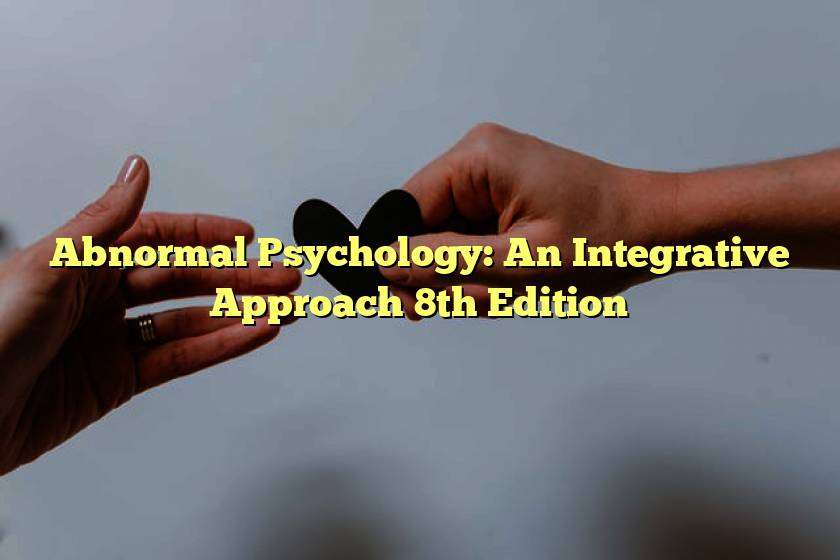Abnormal Psychology is the study of the human mind and behavior that causes impairment or distress. It is an area of psychology that deals with mental illnesses, disorders, and other psychological and behavioral problems. In this article, we will explore some important concepts and ideas from the 8th edition of the book Abnormal Psychology: An Integrative Approach.
What is Abnormal Psychology and Why is it Important?
Abnormal Psychology is important because it helps us understand and identify mental illnesses and disorders, which can lead to effective diagnosis and treatment. Since mental health is closely linked to physical health, the study of Abnormal Psychology is essential to health care providers, clinicians, and those involved in the mental health care industry.
Historical Perspectives on Abnormal Psychology
The history of Abnormal Psychology dates back to the ancient Greeks and Romans, who believed that mental illnesses were caused by supernatural forces such as the gods and spirits. Over time, the study of mental health has evolved, and a more scientific approach has been adopted towards understanding and treating mental illnesses.
Major Theories of Abnormal Psychology
There are several major theories in Abnormal Psychology, which provide a framework for explaining and treating mental illnesses. Some of the major theories include:
-
Biological theory: This theory proposes that mental illnesses arise from biological factors such as genetics, brain chemistry, and other physiological processes.
-
Psychodynamic theory: This theory suggests that mental illnesses arise from unconscious conflicts related to early childhood experiences.
-
Cognitive theory: This theory focuses on how thoughts and beliefs influence behavior and emotions and proposes that mental illnesses stem from distorted or dysfunctional thinking.
-
Behavioral theory: This theory emphasizes how previous behaviors and experiences can lead to the development of mental illnesses.
Diagnostic and Statistical Manual of Mental Disorders (DSM)
The Diagnostic and Statistical Manual of Mental Disorders is a classification system used by mental health professionals to diagnose mental illnesses. The latest version of the DSM is DSM-5, which was published in 2013. It provides updated and revised diagnostic criteria for mental illnesses and disorders, as well as new categories for emerging disorders.
Common Mental Illnesses and Disorders
There are several common mental illnesses and disorders, which include:
-
Depression: A mood disorder characterized by persistent feelings of sadness, hopelessness, and disinterest in activities.
-
Anxiety disorders: A group of disorders characterized by excessive and persistent fear and anxiety, including panic disorder, social anxiety disorder, and generalized anxiety disorder.
-
Eating disorders: A group of disorders characterized by abnormal eating habits, including anorexia nervosa, bulimia nervosa, and binge-eating disorder.
-
Personality disorders: A group of disorders characterized by persistent and maladaptive patterns of behavior, including borderline personality disorder, antisocial personality disorder, and narcissistic personality disorder.
Treatment and Therapy for Mental Illnesses
Treatment for mental illnesses can vary depending on the severity, type, and individual needs of the patient. Some common treatment methods include:
-
Psychotherapy: Also known as talk therapy, psychotherapy involves talking with a mental health professional to identify and address the underlying causes of mental illnesses or to develop coping strategies.
-
Medications: Medication can be used to treat certain mental illnesses, including depression, anxiety, and bipolar disorder.
-
Electroconvulsive therapy (ECT): ECT involves using electric currents to induce controlled seizures in the brain, which can provide relief for severe depression.
Conclusion
Abnormal Psychology: An Integrative Approach 8th Edition, provides a comprehensive overview of the field of Abnormal Psychology, including the major theories, diagnostic criteria, and treatment methods for mental illnesses and disorders. It is a valuable resource for anyone interested in the study of mental health and the provision of effective mental health care.



